Dirt Contractors Tampa
Find top Dirt Contractors in Tampa
Get up to 3 Dirt Contractors quotes for your project today! Compare profiles, reviews, accreditations, portfolio, etc... and choose the best service.
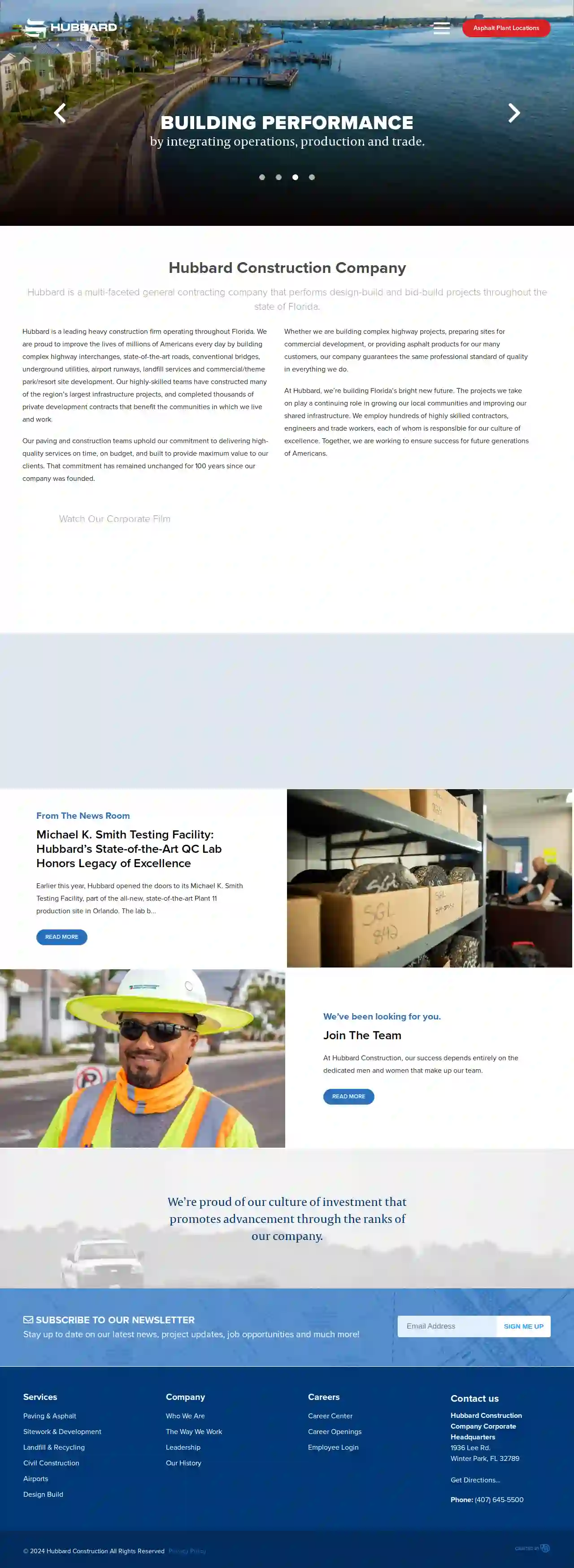
Hubbard Construction Co
4.543 reviews1936 Lee Rd., Winter Park, 32789, USBuilding Together with our clients, communities, and stakeholders. Building Leadership to take on tomorrow’s challenges. Building Performance by integrating operations, production and trade. Building Communities to thrive for generations to come. Hubbard is a multi-faceted general contracting company that performs design-build and bid-build projects throughout the state of Florida. Hubbard is a leading heavy construction firm operating throughout Florida. We are proud to improve the lives of millions of Americans every day by building complex highway interchanges, state-of-the-art roads, conventional bridges, underground utilities, airport runways, landfill services and commercial/theme park/resort site development. Our highly-skilled teams have constructed many of the region’s largest infrastructure projects, and completed thousands of private development contracts that benefit the communities in which we live and work. Our paving and construction teams uphold our commitment to delivering high-quality services on time, on budget, and built to provide maximum value to our clients. That commitment has remained unchanged for 100 years since our company was founded. Whether we are building complex highway projects, preparing sites for commercial development, or providing asphalt products for our many customers, our company guarantees the same professional standard of quality in everything we do. At Hubbard, we’re building Florida’s bright new future. The projects we take on play a continuing role in growing our local communities and improving our shared infrastructure. We employ hundreds of highly skilled contractors, engineers and trade workers, each of whom is responsible for our culture of excellence. Together, we are working to ensure success for future generations of Americans.
- Services
- Why Us?
- Gallery
Get Quote
Construction Services, Inc. of Tampa
51 reviewsTampa, US- Services
- Why Us?
Get Quote
McKenzie Contracting, LLC
1Tampa, US- Services
- Why Us?
Get Quote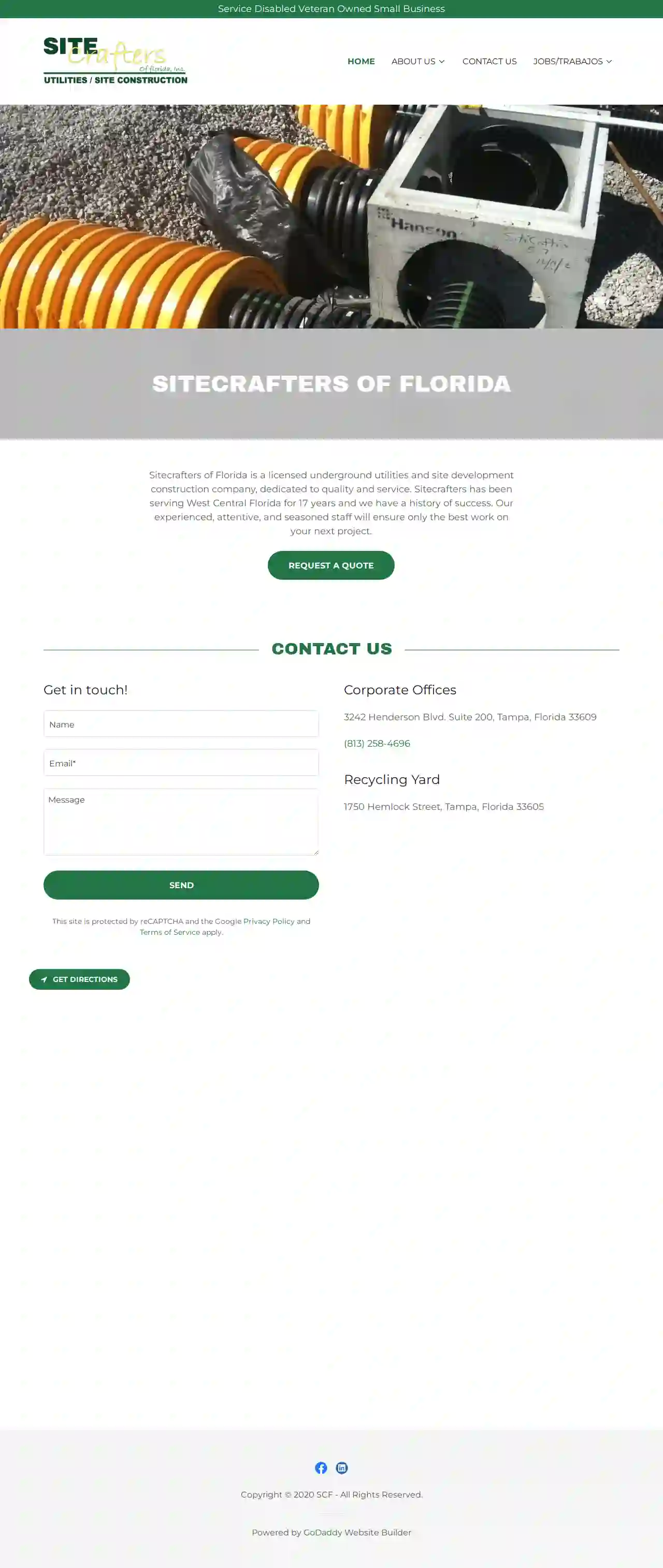
SiteCrafters of Florida
4.54 reviews3242 Henderson Blvd., Suite 200, 3242 Henderson Blvd. Suite 200, Tampa, 33609, USSitecrafters of Florida Sitecrafters of Florida is a licensed underground utilities and site development construction company, dedicated to quality and service. Sitecrafters has been serving West Central Florida for 17 years and we have a history of success. Our experienced, attentive, and seasoned staff will ensure only the best work on your next project.
- Services
- Why Us?
- Gallery
Get Quote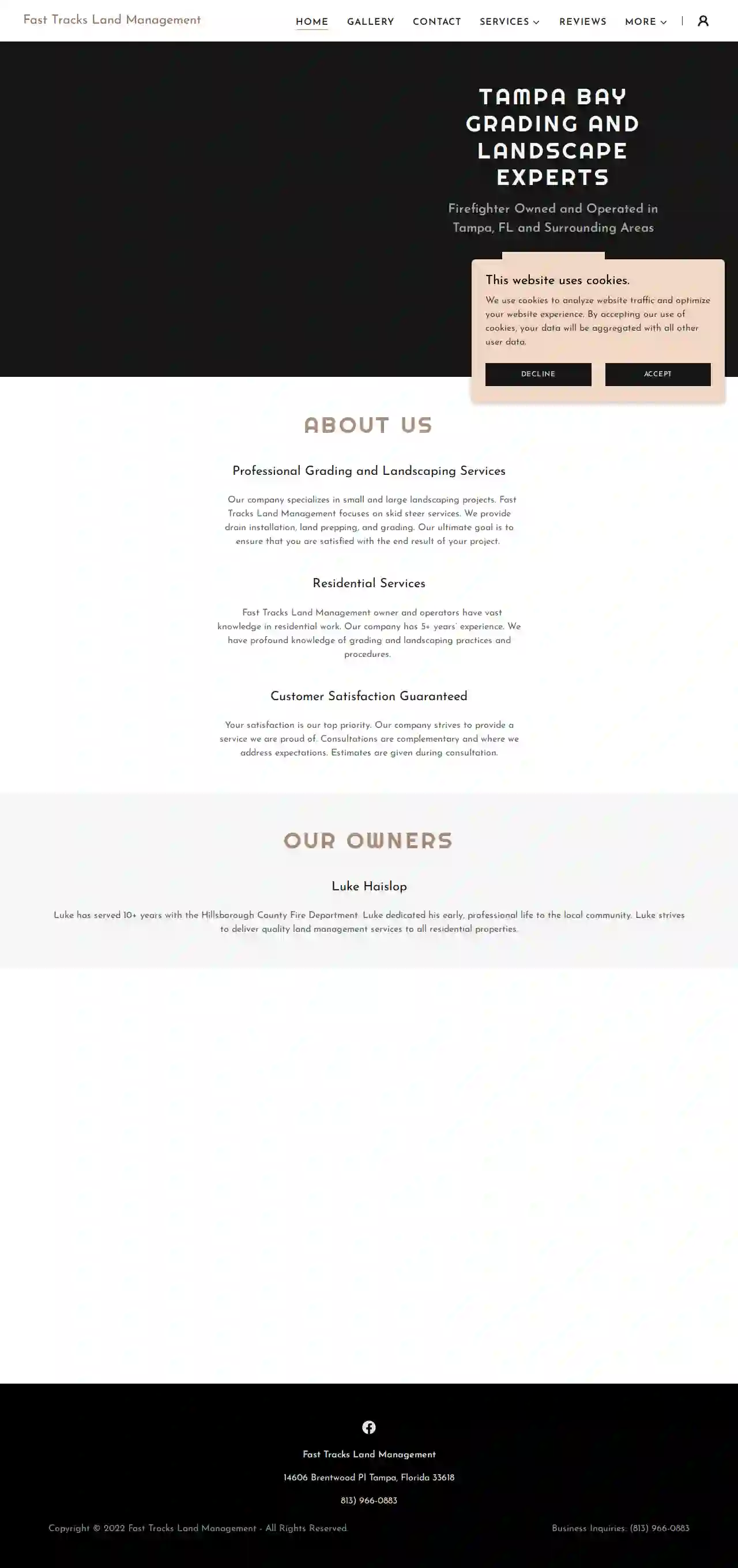
Fast Tracks Land Management
584 reviewsTampa, US- Services
- Why Us?
Get Quote
Florida Landworx, LLC
5197 reviewsTampa, US- Services
- Why Us?
Get Quote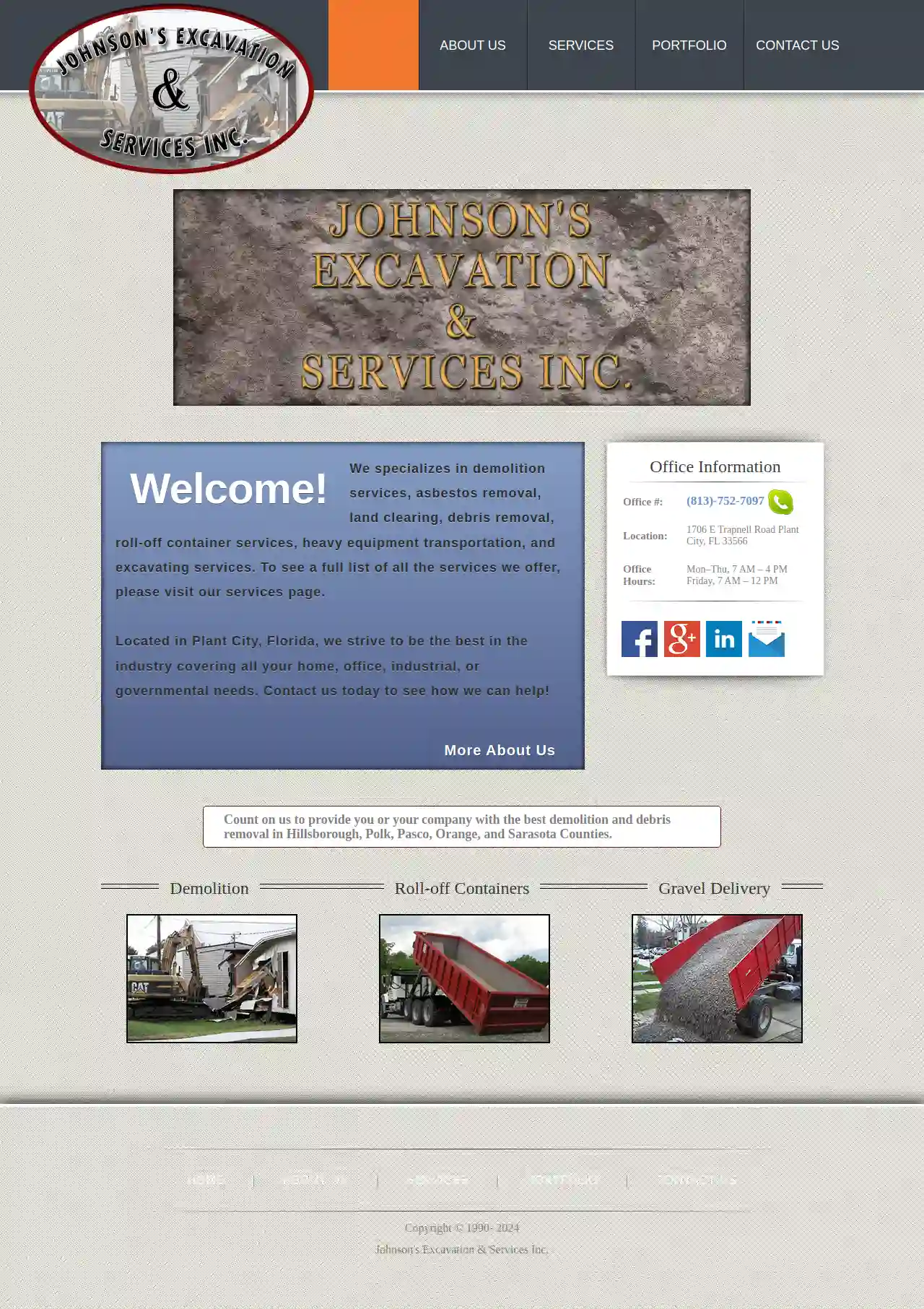
Johnson's Excavation & Services Inc
58 reviewsTampa, US- Services
- Why Us?
Get Quote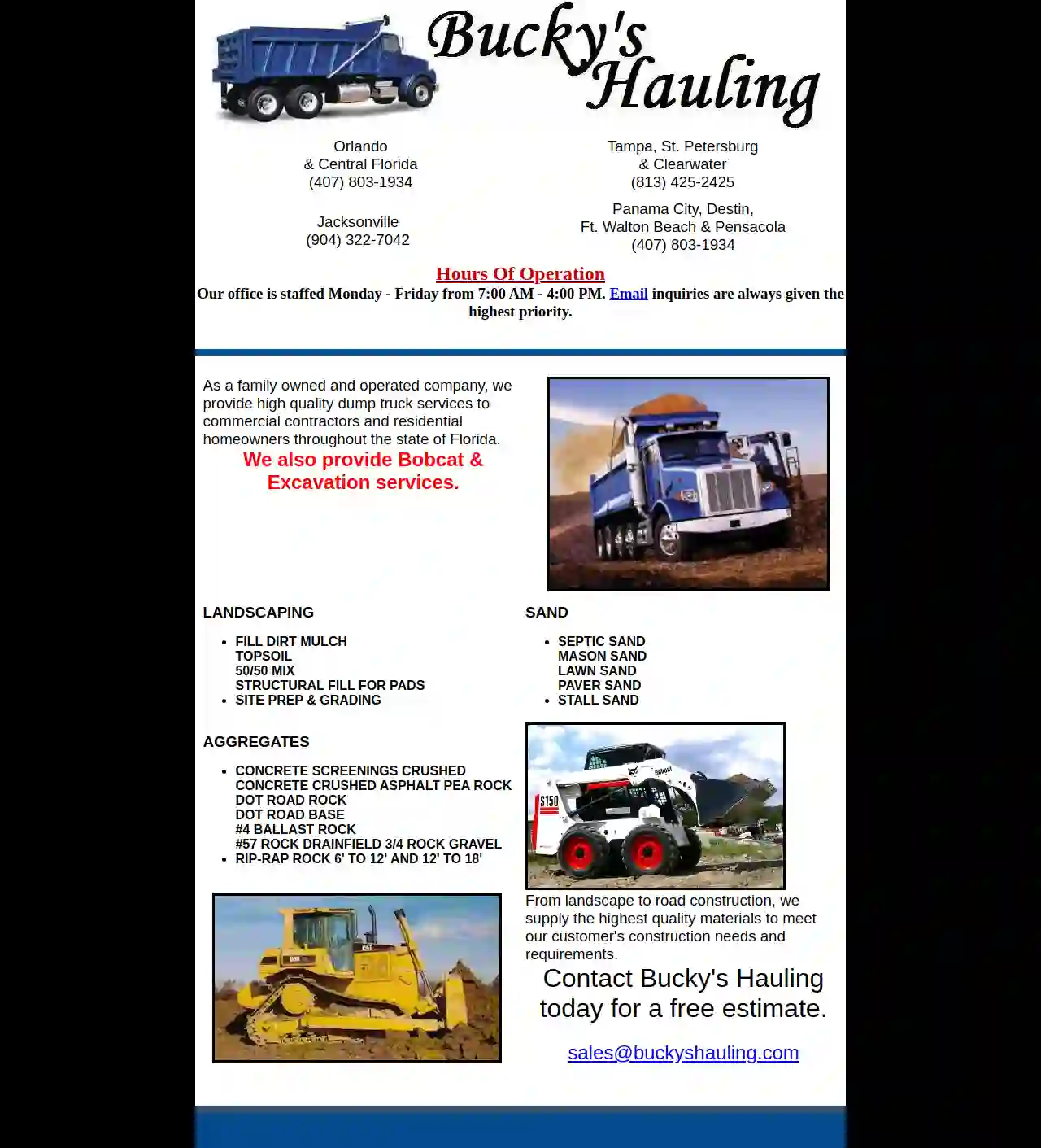
Bucky's Tampa
3.73 reviewsTampa, US- Services
- Why Us?
Get Quote
Over 3,943+ Excavation Pros onboarded
Our excavation contractors operate in Tampa and surrounding areas!
ExcavationHQ has curated and vetted the Best Excavation Pros in and around Tampa. Find a trustworthy business today.
Frequently Asked Questions About Dirt Contractors
- Plant Selection: Understanding your soil's pH and nutrient levels helps you choose plants that will thrive in those conditions.
- Fertilizer Recommendations: Soil tests reveal nutrient deficiencies, allowing you to apply appropriate fertilizers to meet plant needs.
- Soil Amendments: Identify soil imbalances, such as compaction or high clay content, and recommend amendments to improve soil structure and drainage.
- Construction Projects: Assess soil bearing capacity and other properties to ensure the stability and safety of foundations and other structures.
- Environmental Assessments: Detect potential soil contamination and determine the need for remediation.
- Designated Disposal Facilities: Contact your local waste management authority or search online for designated dirt and debris disposal facilities in your area. They accept various types of soil and construction materials.
- Recycling Centers: Some recycling centers accept clean fill dirt, concrete, or brick for reuse in other construction projects.
- Donation: If the dirt is clean and suitable for gardening or landscaping, consider donating it to community gardens, schools, or neighbors with landscaping projects.
- Clear the Area: Remove any obstacles, such as furniture, toys, or landscaping features, from the designated delivery zone.
- Mark Utilities: Contact your local utility companies to have underground utilities, such as water lines, gas lines, or electrical cables, marked to prevent accidental damage during delivery.
- Protect Existing Landscaping: Cover or move any valuable plants, shrubs, or trees that might be affected by the dirt delivery.
- Provide Access: Ensure the delivery truck has clear access to the delivery zone, including wide enough gates or driveways.
- Communicate with the Contractor: Discuss any specific instructions or concerns you have with the dirt contractor before delivery day.
What is a soil test, and why is it important?
What is the best way to dispose of excess dirt?
How do I prepare my yard for dirt delivery?
What is the difference between screened topsoil and unscreened topsoil?
Screened Topsoil: Processed through a screening machine to remove large debris, rocks, and clumps, resulting in a finer and more uniform texture. It's generally considered higher quality and is preferred for landscaping, gardening, and lawn establishment.
Unscreened Topsoil: Not processed through a screening machine and may contain various sizes of debris, rocks, and clumps. It's typically less expensive than screened topsoil but may require additional work to remove debris before use.
Choosing between screened and unscreened topsoil depends on your project's specific needs and budget.
What is a soil test, and why is it important?
- Plant Selection: Understanding your soil's pH and nutrient levels helps you choose plants that will thrive in those conditions.
- Fertilizer Recommendations: Soil tests reveal nutrient deficiencies, allowing you to apply appropriate fertilizers to meet plant needs.
- Soil Amendments: Identify soil imbalances, such as compaction or high clay content, and recommend amendments to improve soil structure and drainage.
- Construction Projects: Assess soil bearing capacity and other properties to ensure the stability and safety of foundations and other structures.
- Environmental Assessments: Detect potential soil contamination and determine the need for remediation.
What is the best way to dispose of excess dirt?
- Designated Disposal Facilities: Contact your local waste management authority or search online for designated dirt and debris disposal facilities in your area. They accept various types of soil and construction materials.
- Recycling Centers: Some recycling centers accept clean fill dirt, concrete, or brick for reuse in other construction projects.
- Donation: If the dirt is clean and suitable for gardening or landscaping, consider donating it to community gardens, schools, or neighbors with landscaping projects.
How do I prepare my yard for dirt delivery?
- Clear the Area: Remove any obstacles, such as furniture, toys, or landscaping features, from the designated delivery zone.
- Mark Utilities: Contact your local utility companies to have underground utilities, such as water lines, gas lines, or electrical cables, marked to prevent accidental damage during delivery.
- Protect Existing Landscaping: Cover or move any valuable plants, shrubs, or trees that might be affected by the dirt delivery.
- Provide Access: Ensure the delivery truck has clear access to the delivery zone, including wide enough gates or driveways.
- Communicate with the Contractor: Discuss any specific instructions or concerns you have with the dirt contractor before delivery day.
What is the difference between screened topsoil and unscreened topsoil?
Screened Topsoil: Processed through a screening machine to remove large debris, rocks, and clumps, resulting in a finer and more uniform texture. It's generally considered higher quality and is preferred for landscaping, gardening, and lawn establishment.
Unscreened Topsoil: Not processed through a screening machine and may contain various sizes of debris, rocks, and clumps. It's typically less expensive than screened topsoil but may require additional work to remove debris before use.
Choosing between screened and unscreened topsoil depends on your project's specific needs and budget.